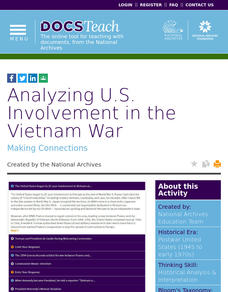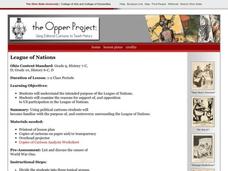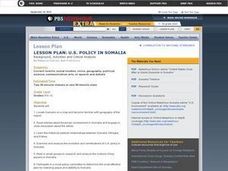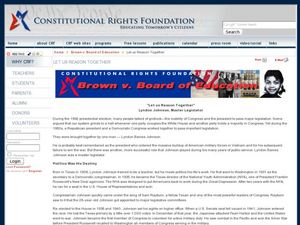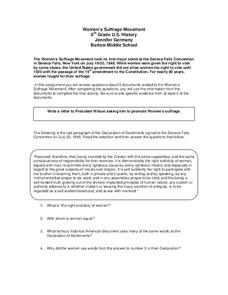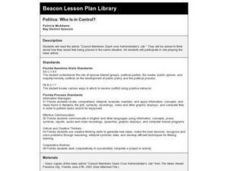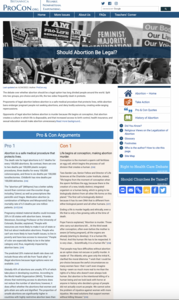Smithsonian Institution
Us vs. Them: The Chinese Exclusion Act of 1882
Immigration issues are nothing new. An interesting lesson focuses on the racially motivated Chinese Exclusion Act of 1882 and its impact on the Chinese American community. Scholars read articles, analyze political cartoons, and...
Annenberg Foundation
Electoral Politics
You won't just get a lesson plan when you click on this resource. As you click on the related resources located to the left of the screen, you'll find, a professional development video, teacher/student notes, lesson plan, and...
Curated OER
Artists Teach Us to See the World through Visual Symbols
Tenth graders analyze a biographical piece of art by Raymond Saunders. They identify shapes, symbols, and lines that are used, and how the piece relates to the artist's life and modern society. They design and create an original piece of...
College Board
Civic Knowledge and Action in AP U.S. Government and Politics
Vote, it's your civic duty! The high school lesson focuses on voter turnout and civic participation with a series of activities. Young scholars analyze data to discover voter turnout trends, complete worksheets, and participate in group...
DocsTeach
Analyzing US Involvement in the Vietnam War
War: unavoidable or a necessary evil? A thought-provoking activity explores the United States' long involvement in the Vietnam War as well as the aftermath. Scholars research and summarize primary documents and complete online worksheets...
Curated OER
League of Nations
What is the League of Nations, when did it begin, and what is it's purpose? Young political minds can explore the answers to these questions through political cartoon analysis. Included are several political cartoons, an analysis...
Smithsonian Institution
Borders with the World: Mexican-American War and U.S. Southern Borderlands
The Mexican-American War created social borders—not just physical ones. Scholars learn about the effects of the Mexican-American War on the people living in the borderlands using text excerpts, maps, and partnered activities. Academics...
Curated OER
US Policy In Somalia
Students investigate the US policy for the country of Somalia. They conduct research using a variety of resources. They locate the country and then discuss major geographical features of the areas. Students discuss the present US...
Curated OER
"Let us Reason Together" Lyndon Johnson, Master Legislator
Pupils explore the contributions of Lyndon B. Johnson. In this congress lesson, students listen to their instructor lecture on the prowess of Lyndon B. Johnson's legislative skills. Pupils respond to discussion questions connected to the...
Curated OER
Women’s Suffrage Movement
Though the movement for Women's Suffrage stretched over several decades and across two centuries, the final few years were the most difficult hurdle in many ways. Use a document-based question writing exercise to make inferences about...
Constitutional Rights Foundation
Winner-Take-All: The Two-Party System
Two's company, three's a crowd. High school historians learn about the Electoral College, a two-party, winner-take-all voting system in the United States. The lesson explains the pros and cons of the two-party system, roadblocks for...
Curated OER
Teacher Notes
Gathering information, distinguishing between arguments, preparing an oral presentation; these skills are fostered as 10th graders explore aspects of global trade and politics. They use the Internet to gather information about NATO, The...
Curated OER
The Vietnam War: Geopolitical map and US Involvement
Students identify the important geographic and political locations on a map of Vietnam, Laos, and Cambodia. They draw and label 19 items of geographic and political importance. Students are introduced to the Vietnam War through power...
Curated OER
We the People: A Study in American Voter Turnout: US Government
Students examine and compare voter turnout in US Elections. They write a letter to a favorite candidate or representative suggesting ways to increase voter turnout.
Curated OER
Willing to Participate: Political Engagement of Young Adults
Students consider what it means to be politically involved. In this civics lesson, students discuss voting as a privilege or right. Students also discuss how they may be able to effect social change through political involvement.
Constitutional Rights Foundation
Refugees from the Caribbean: Cuban and Haitian “Boat People”
Should refugees fleeing poverty be allowed the same entrance into the United States as those fleeing persecution? High schoolers read about US foreign policy in the late 20th century regarding refugees from Cuba and Haiti, and engage in...
Curated OER
Donkeys and Elephants and Voters, Oh My!
Students celebrate party politics. In this American politics activity, students discover what the 2 main political parties in the country are and discuss their functions. Students then participate in a classroom simulation that requires...
Curated OER
Death and Taxes
Students explore the "death tax" and analyze statistical information about how the government taxes dead people. They research sources to determine the validity of a anti-tax group campaign and John McCain's claims about taxes. ...
Curated OER
Photography and the National Park Service
During the 1800s the United States was expanding westward; land was there for the taking. Kids explore how some early photographers used their photography to influenced the US Congress to save areas like Mirror Lake. They...
Curated OER
Politics: Who Is in Control?
Fourth graders read the article "Council Members Clash over Administrator's Job." They be asked to think about how they would feel being placed in the same situation. All students participate in role playing the news article.
Constitutional Rights Foundation
Global Warming and the Paris Agreement
Global warming: a political debate or a scientific fact? Young historians read text, complete activities, and participate in group discussion to understand the political debate surrounding global warming and the US decision to withdraw...
Curated OER
Abortion
Abortion has remained a highly controversial issue ever since the landmark 1973 Roe v. Wade decision. Using the website, learners sift through all the information they need to participate in a debate about the topic. They learn about the...
Roy Rosenzweig Center for History and New Media
Immigration: Why Come to the United States?
Don't limit your curriculum to texts! Young historians listen to a song, read an interview, and examine a cartoon as they explore motivations for immigrating to the US in the late 19th and early 20th centuries.
Theodore Roosevelt Association
Roosevelt's Legacy: Conservation
The legacy of Theodore Roosevelt carries through modern American politics, economics, foreign policy, and society. But his proudest and most profound efforts were in the world of conservation, and in preserving the natural beauty of...




